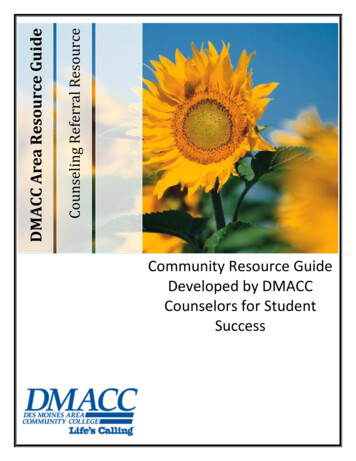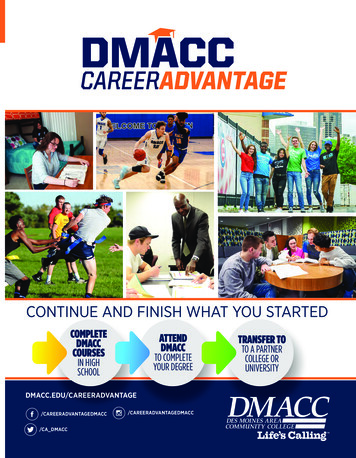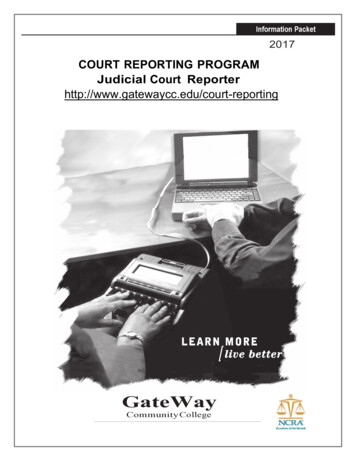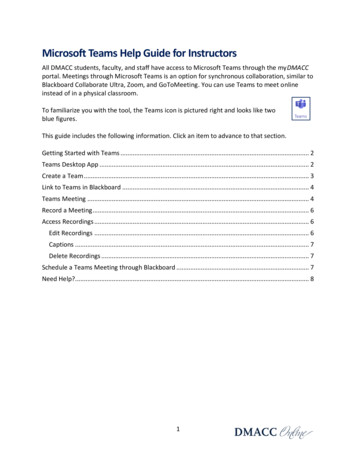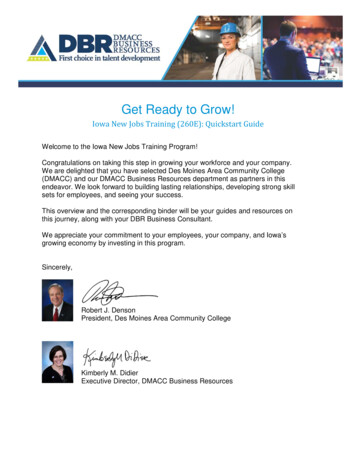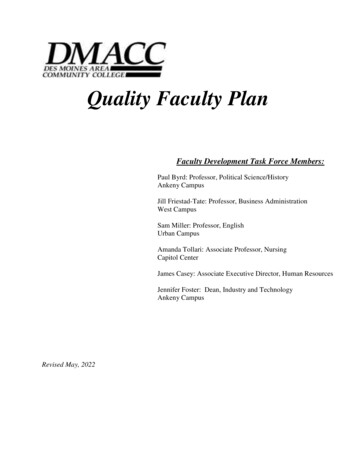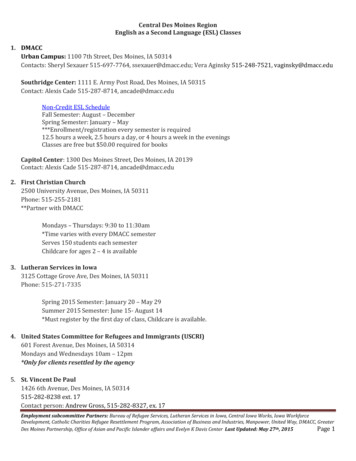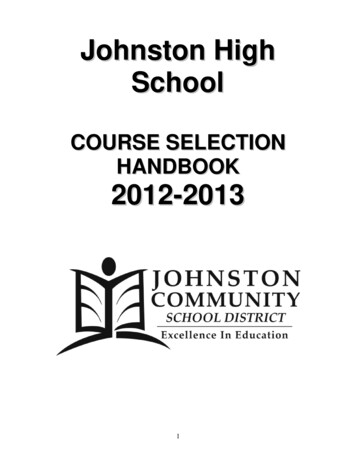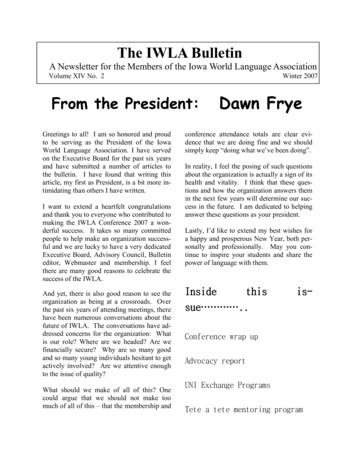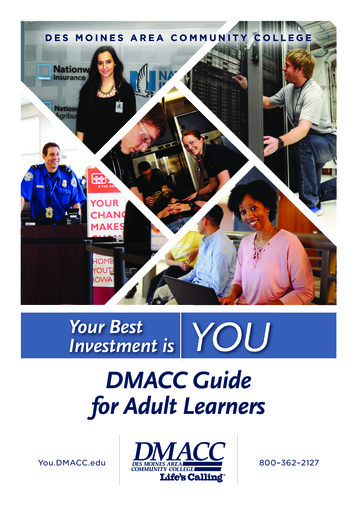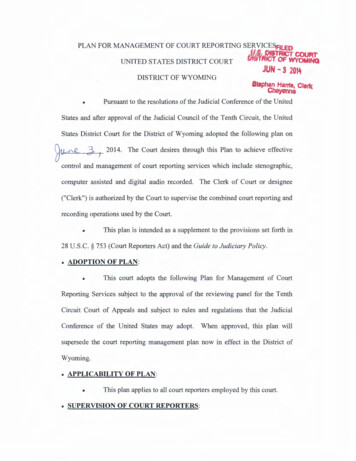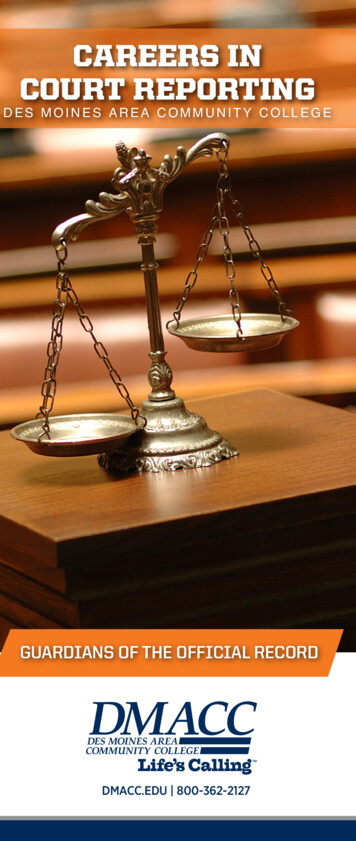
Transcription
CAREERS INCOURT REPORTINGDES MOINES AREA COMMUNITY COLLEGEGUARDIANS OF THE OFFICIAL RECORDDMACCDES MOINES AREACOMMUNITY COLLEGELife's Calling DMACC.EDU 800-362-2127
Facts About the DMACCCourt Reporting Program1.Low-cost tuition. Additional fees are assessedfor technology, online and web-blended classes.Additional tuition costs will be incurred if speedclasses are repeated.2.DMACC is accredited by the Higher LearningCommission of the North Central Association ofColleges & Schools.3.This program is approved by the National CourtReporters Association.4.Students spend 15–20 hours each week in aclass setting.5.The program includes online and web-blendedclasses for fexible scheduling.6.Personalized student services are available on theNewton Campus, including free tutoring.7.Mentoring and internships are provided byprofessional court reporters.8.Highly experienced faculty members.9.Join the Student Court Reporting Association formore networking opportunities with professionalcourt reporters.10. Scholarships are available.DMACC Court Reporting:Exceptional Facilities,Equipment and InstructionBased at our Newton Campus, DMACC’s program isthe only one of its kind in Iowa. It was developed duringa year of collaboration with the Iowa Court ReportersAssociation and the Iowa Bar Association.The program began in 2014. As with all DMACCprograms, court reporting students will learn on thesame equipment used by current professionals andwill be taught by credentialed instructors withreal-world experience.Faculty MembersDr. Patricia L. (Patti) Dean Ziegler, CRI, CPE, M.A, Ed. D.Deborah L. DuBuc, CRI, RPR, CPE, M.A.Cathy L. Penniston, CSR, RPR, CRI, M.A.Sarah J. Bowers, RPR, CSR
Court Reporting:A unique skill that leads togreat career opportunities!Trained court reporters use theirunique skills to pursue career options: Ofcial court reporters work in state andfederal courthouses. Freelance court reporters take legal depositionswith lawyers. Broadcast captioners create captions for liveTV programs. CART providers create transcripts for deaf andhearing-impaired individuals in classroomsand meetings.The job outlook for court reporters inIowa is strong: More than 30 job openings are expected eachyear until projectionsThe starting salary for court reporters isapproximately 56,000– 65,000 per year.www.bls.gov/oes/current/oes273092.htm#st
Court Reporting (AssociateDegree in Applied Science)Students must complete the following courses andmaintain at least a 2.0 grade point average. Machineshorthand speed requirements must be met to advanceto the next speed class and graduate from the program.Term 1–FallCRC 100 - Machine Shorthand Theory ICRC 102 - Machine Shorthand Skills/Techniques IADM 157 - Business EnglishADM 208 - Legal TerminologyTerm 2–SpringCRC 130 - Machine Shorthand Theory IICRC 132 - Machine Shorthand Skills/Techniques IICRC 165 - Realtime Punctuation and ProofreadingCRC 195 - Realtime Medical TerminologyTerm 3–SummerCRC 160 - Introduction to Speed DevelopmentCRC 15 - Introduction to Realtime TechnologyAny AAS Core Soc & Behavioral Science/Humanities CourseTerm 4–FallCRC 175 - Realtime Technology ApplicationsCRC 180 - Single-Voice Speed Development ICRC 183 - Multi-Voice Speed Development ICRC 190 - Realtime Court Reporting Procedures IAny AAS Core Math/Science CourseTerm 5–SpringCRC 220 - Single-Voice Speed Development IICRC 223 - Multi-Voice Speed Development IICRC 230 - Realtime Court Reporting Procedures IIAny AAS Core Distributed CoursesTerm 6–SummerCRC 250 - Single-Voice Speed Development IIICRC 253 - Multi-Voice Speed Development IIICRC 275 - Internship*Progress in theory and speed classes is very individualized. Studentsmake progress at diferent rates, depending on the amount of timespent practicing and the quality of practice. Students should plan tospend a minimum- - - of 10-15 hours outside of class practicing on theirsteno machines (in addition to 9–12 hours of class practice).
Do you like to text?Court reporters useshorthand brief forms too!PeopleAre youTodayWith the“P-PLRUTODW-TWhen theIs theTo theCannotWH-TS-TTOTKWOTThe drama of the courtroomdrew me to this profession. It’svery intriguing. DMACC not onlyteaches us this very unique,in-demand skill, they also connectus with working reporters whowill help us network, which canultimately result in employment.Court reporting is also a lifelongprofession with great pay, and it isnever the same day after day.”Morgan OlsonDMACC Court Reporting StudentDo you have what it takesto become a realtimecourt reporter?u Strong vocabulary, grammar and editing skills.u Attention to detail.u Ability to focus for extended periods of time.u Self-motivation and persistence.u Technology skills.
DMACC’s Program is approved byThe National Court Reporters AssociationTAKE THE NEXT STEP!Attend the next information sessionCourt Reporting is ofered exclusivelyon DMACC’s Newton 22 or toll-free at 800-362-2127, Campus Code 5.Newton Campus Address600 North 2nd Avenue West, Newton, Iowa 50208*Students may need to repeat some speed classes to meet speed/accuracy requirements. Studentsrepeating speed classes will incur additional tuition charges. According to the National Court ReportersAssociation, the national average for completion of court reporting programs is 33 months.DMACCDES MOINES AREACOMMUNITY COLLEGELife's Calling'"800-362-2127 DMACC.EDUDes Moines Area Community College (DMACC) shall not engage in nor allow discrimination covered by law against anyperson, group or organization. This includes in its programs, activities, employment practices, hiring practices or theprovision of services. The full DMACC Nondiscrimination policy is available online at nd.dmacc.edu.13559-11-20-L-1000-M
COURT REPORTING DES MOINES AREA COMMUNITY COLLEGE DMACC.EDU 800-362-2127 . Facts About the DMACC Court Reporting Program 1. Low-cost tuition. Additional fees are assessed . CRC 230 - Realtime Court Reporting Procedures II . Any AAS Core Distributed Courses . Term 6-Summer. CRC 250 - Single-Voice Speed Development III
